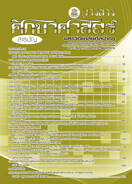การประเมินหลักสูตรศิลปศาสตรบัณฑิต สาขาวิชาจิตวิทยา คณะศึกษาศาสตร์ มหาวิทยาลัยศิลปากร
Main Article Content
Abstract
ผลการวิจัย พบว่า
1. การประเมินสภาวะแวดล้อมเกี่ยวกับ แผนการดำเนินงานของภาควิชา จุดอ่อน/จุดแข็งของ ภาควิชา ในภาพรวม มีความเหมาะสมอยู่ในระดับมาก
2. การประเมินปัจจัยนำเข้าเกี่ยวกับวัตถุประสงค์ของหลักสูตร โครงสร้างและเนื้อหาสาระของ หลักสูตร คุณสมบัติของผู้เรียน/การสอบคัดเลือก คุณสมบัติของคณาจารย์ที่สอน/อาจารย์ที่ปรึกษาทาง วิชาการ สภาพแวดล้อมทางกายภาพ วัสดุอุปกรณ์ และสิ่งอำนวยความสะดวกต่าง ๆ และงบประมาณใน การผลิตบัณฑิต ในภาพรวม มีความเหมาะสมอยู่ในระดับมาก
3. การประเมินกระบวนการเกี่ยวกับพฤติกรรมการจัดการเรียนการสอนของผู้สอน พฤติกรรม การเรียนรู้ของผู้เรียน การฝึกประสบการณ์วิชาชีพทางจิตวิทยา การจัดการเรียนการสอน การให้บริการและ การสนับสนุน การบริหารหลักสูตร และการประกันคุณภาพ ในภาพรวม มีความเหมาะสมอยู่ในระดับมาก
4. การประเมินผลผลิตเกี่ยวกับ ผลสัมฤทธิ์ทางการเรียนของนักศึกษา ร้อยละของนักศึกษาที่สำเร็จ การศึกษาตามระยะเวลาที่กำหนดในหลักสูตร และคุณลักษณะของบัณฑิต ในภาพรวม มีความเหมาะสมอยู่ ในระดับมาก
5. การประเมินผลกระทบเกี่ยวกับ ผลการปฏิบัติงานของบัณฑิต และความพึงพอใจของผู้ใช้ บัณฑิต ในภาพรวม มีความเหมาะสมอยู่ในระดับมากที่สุด
An Evaluation of Bachelor of Arts Program in Psychology, Faculty of Education, Silpakorn University
The purposes of this study aimed 1) to evaluate Bachelor of Arts Program in Psychology by CIPPI Model which including context, Context Evaluation, Input Evaluation, Process Evaluation, Product Evaluation, and Impact Evaluation 2) to study the guidelines developing and improving the Curriculum Program in Psychology which including context, Context Evaluation, Input Evaluation, Process Evaluation, Product Evaluation, and Impact Evaluation. The population were 1) 68 current students, 2) 74 graduate students, 3) 5 graduates’ employers, 4) 5 department instructors and experts in the field of psychology, 5) 3 faculty executives, and 6) 5 participants. The research instruments were questionnaires and interview form. The Quantitative data were analyzed by frequency, percentage, mean (), and standard deviation (S.D.).
The Qualitative data were content analysis.
The results showed that :
1. Context Evaluation: The curriculum plan, weakness and strength were in a high level.
2. Input Evaluation: The purpose of the program, the structure and content of the program, student characteristic/selective examination, instructor/adviser characteristic, physical environment, material and facilities, and budget were in a high level.
3. Process Evaluation: Instructor behavior, student behavior, practicum in psychology, teaching and learning activities, service, the curriculum management, and quality assurance in education were in a high level.
4. Product Evaluation: Learning Achievement, the percentage of graduate students, and graduate qualification were in a high level.
5. Impact Evaluation: Graduates’ employers were highest level of satisfaction with graduate students.


